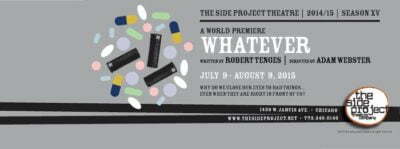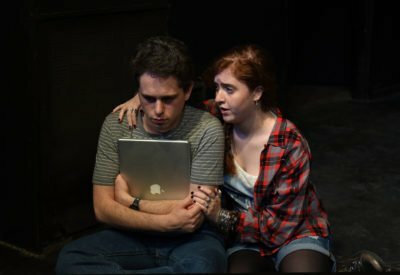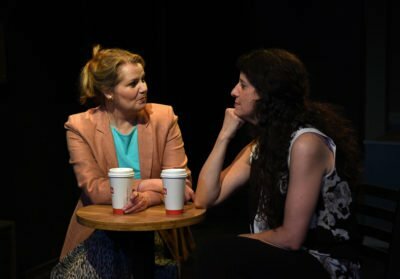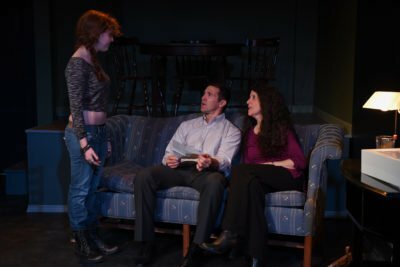Whatever
By Robert Tenges
Directed by Adam Webster
Produced by The Side Project, Chicago
Everything’s Terrible, and Everybody Sucks
Naming his newest play Whatever was a bold move on Robert Tenges’s part. The author, who has a longstanding relationship with The Side Project, specializes in drama about teenage struggles, and in the past, has been praised for finding high stakes in mundane situations. But in Whatever, he overplays his hand by stuffing even more token references into his script than in Spring Awakening the Musical’s, and inducing the same empathy fatigue the title of his play implicitly criticizes. Though the production features capable actors and some clever costume designs by Crystal Jovae Mazur, director Adam Webster’s slow pacing does not add depth to Tenges’s unpleasant characters, but only made me more eager to get away from them.

There are seven Akron residents in Whatever whose lives are entangled, but are too emotionally withdrawn to be called “connected.” High school student Chloe (Grace Melon) is pregnant, and plans to get an abortion, though she has to lie to her father about why she needs the money. She has enlisted the aid of her boyfriend, Declan (Aaron Lockman), who is supposed to be taking medication for his anger control issues, but often does not because he dislikes the side effects. At least he likes his new gun. Chloe is fairly certain she was actually impregnated by her guidance counselor, Scott (Bryan Breau), whom she has been having a long-running affair with, but decides Declan doesn’t need to know about that. Both of them support her decision to abort, although Declan is hurt that Chloe doesn’t seem to want to ever create a baby with him, and Scott thinks his relationship with Chloe needs to end.

Meanwhile, Chloe’s widowed father, Henry (Josh Odor), has been having intimacy problems with his girlfriend, Rachel (Kirsten D’Aurelio). She has a history of dating guys she decided were losers and has a meddlesome mother; he doesn’t actually enjoy other peoples’ company all that much. Henry’s boss, Mike (Mike Rice), used to be his friend, but now things are awkward because he’s the one negotiating with Henry over the terms of his promotion, and at the same time is going through a divorce, which leaves him needy when he and Henry need to be at their most professional. And Declan’s mom, Ivy (Shawna Tucker) is lonely and at her wit’s end with him, which is why she tries to strike up a friendship with Rachel.
Got all that? Because although many personal, political, and ethical issues are introduced during these entanglements, the characters’ dialogue is so slow and unilluminating that in a few scenes, I forgot what the subject of their conversation was. The actors make them seem realistic; and I liked the awkwardness and vague hypocrisy of D’Aurelio’s Rachel, and the sullen disgust of Melon’s Chloe. Their scenes together are the most tense and lively in the play. I found Tucker’s Ivy to be the most sympathetic character, since she has a serious problem on her hands and is aware of how pathetic she is, and in one late scene, directly opposes the institutional apathy that has been poisoning everybody’s lives.

Tenges’s realistic dialogue, however, is his downfall. There has to be some kind of art to make drama superior to people-watching. I gather that his main concern was disconnectedness, and specifically the lack of fulfilling friendships many people report. But to listen to these dialogues is to remind you of why people don’t like talking to each other. Time and time again, after listening to somebody rattle off every one of their failed aspirations, trifling vanities, and accumulating realizations of the futility of their life, a friend is expected to respond by sharing their own daily humiliations, which they are reluctant to do. When Henry says he never feels happier when he’s with other people than when he’s alone, it’s a relief somebody finally said so. I sure wouldn’t want a close emotional connection to any of the people we see in his life. Tenges quite accurately captured the feeling of what it’s like to be a teenager with few real accomplishment to take pride in, but his overly negative depiction of adult life doesn’t aid his plea for people to appreciate each other’s value more.
Somewhat Recommended
Jacob Davis
[email protected]
Reviewed July 16, 2015
For more information, see Whatever’s page on Theatre in Chicago.
Playing at The Side Project, 1439 W Jarvis, Chicago. Tickets are $20 with discounts for seniors and students; to order, call 773-340-0140 or visit thesideproject.net. Plays Thursdays-Saturdays at 7:30 pm and Sundays at 3:00 pm through August 9. Running time is one hour and forty minutes with no intermission.
